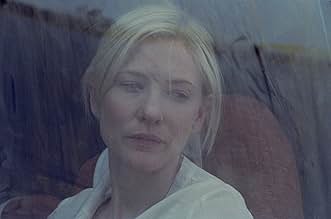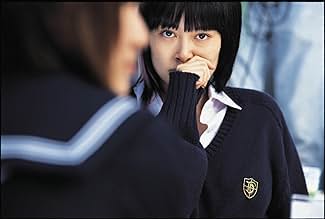La tragedia sorprende a un pareja cuando está de vacaciones en el desierto marroquí, dando comienzo a una historia entrelazada que afecta a cuatro familias diferentes.La tragedia sorprende a un pareja cuando está de vacaciones en el desierto marroquí, dando comienzo a una historia entrelazada que afecta a cuatro familias diferentes.La tragedia sorprende a un pareja cuando está de vacaciones en el desierto marroquí, dando comienzo a una historia entrelazada que afecta a cuatro familias diferentes.
- Dirección
- Guionistas
- Elenco
- Ganó 1 premio Óscar
- 45 premios ganados y 137 nominaciones en total
Opiniones destacadas
4 tenuously connected stories, beautifully shot, admirable soundtrack, and competent acting and directing. But, psychologically, philosophically, sociologically meaningful? Perhaps in their individual stories? But as a whole, I for one cannot connect the dots in this one.
Different people, different races, socio economic classes, cultures, countries, oh, and of course languages, hence communication. A lot of them making really stupid decisions, one in each tale, giving rise to tension and drama in each. Rich or poor, east or west, weak or strong, everyone is prone to just doing the wrong things at times.
It was a decent watch, even given the over bloated running time. If it affected you? Then you have understood the directors language I guess.
Different people, different races, socio economic classes, cultures, countries, oh, and of course languages, hence communication. A lot of them making really stupid decisions, one in each tale, giving rise to tension and drama in each. Rich or poor, east or west, weak or strong, everyone is prone to just doing the wrong things at times.
It was a decent watch, even given the over bloated running time. If it affected you? Then you have understood the directors language I guess.
The film opens in the Moroccan desert: an elderly tribesman trades a high-powered rifle to a goat herder for 500 diram & a goat. He hands the rifle to his two young sons and tells them to kill jackals with it, to protect the herd. As practice, the start shooting at rocks, a car passing on the hill below, and finally a bus. That's the only thing they manage to hit, putting a bullet through the shoulder of a tourist. In the middle of nowhere, there's no medical help, and no one wants to wait with the injured person except her husband. That's the setup of this complex, challenging film. It splits into four related stories, one in Japan, two in Morocco, and the last in California, where a housekeeper has to get to her son's wedding in Mexico, but has no one to watch the two children in her care. She decides to take them along, and of course things go sour. A good cast, great acting, fine cinematography, and expert direction make this film well worth watching. It's not for everyone, but for people who are ready to see deliberately paced low-key thriller, this is one good film. The split story line is reminiscent of "Syriana," but in no way copies it.
"Babel" centers on several groups of people in 4 countries that are all connected by one freak accident
Alejandro González Iñárritu takes us from North Africa to North America to Asia
His film exposes four unconnected story lines that are eventually divulged to be inextricably linked to one another
The first involves an isolated family of goat herders who live in the High Plateaus of the Moroccan desert where two young boys are testing a rifle's range handed by their father to protect their goats from jackals...
The second concerns a Middle-class American couple on a bus tour of Morocco trying to save together their damaged marriage
Meanwhile, in the US, there is grave danger for an undocumented immigranta Mexican nanny as she tries to return to United States after she wrongfully decides to take her two blonde-haired young charges to her son's wedding across the Mexican border, despite her employers' sudden change of plans, that needs that she remains with them and miss the joyful occasion
And on the opposite side of the world, we follow, in Tokyo, an alienated, confused deaf and mute teenage student, recovering from her mother's suicide, who eases her feelings of depression and loneliness by trying to win the friendship or attention of every man or adolescent who crosses her path She flirts with sexual exhibitionism to attract the attention of her distant and uncommunicative father
"Babel" tries to make a point and the point is that when people can't or won't communicate, unpredictable paths can lead to tragic consequences It also tries to leave a message of how a 'shooting' from a simple 'gift' can set off a chain reaction of tragic events in three continents and four countries over which the different characters have exceedingly uncomfortable human emotion
Out of the entire cast, it is only Rinko Kikuchi as Chieko who steals the movie especially when she transmits to her friends her mad decision of sexual aggressiveness, saying to all: "Now they're going to meet the real hairy monster." This scene remembered me, in some way, Sharon Stone uncrossing legs in "Basic Instinct."
The first involves an isolated family of goat herders who live in the High Plateaus of the Moroccan desert where two young boys are testing a rifle's range handed by their father to protect their goats from jackals...
The second concerns a Middle-class American couple on a bus tour of Morocco trying to save together their damaged marriage
Meanwhile, in the US, there is grave danger for an undocumented immigranta Mexican nanny as she tries to return to United States after she wrongfully decides to take her two blonde-haired young charges to her son's wedding across the Mexican border, despite her employers' sudden change of plans, that needs that she remains with them and miss the joyful occasion
And on the opposite side of the world, we follow, in Tokyo, an alienated, confused deaf and mute teenage student, recovering from her mother's suicide, who eases her feelings of depression and loneliness by trying to win the friendship or attention of every man or adolescent who crosses her path She flirts with sexual exhibitionism to attract the attention of her distant and uncommunicative father
"Babel" tries to make a point and the point is that when people can't or won't communicate, unpredictable paths can lead to tragic consequences It also tries to leave a message of how a 'shooting' from a simple 'gift' can set off a chain reaction of tragic events in three continents and four countries over which the different characters have exceedingly uncomfortable human emotion
Out of the entire cast, it is only Rinko Kikuchi as Chieko who steals the movie especially when she transmits to her friends her mad decision of sexual aggressiveness, saying to all: "Now they're going to meet the real hairy monster." This scene remembered me, in some way, Sharon Stone uncrossing legs in "Basic Instinct."
Alejandro Gonzalez Inarritu's Babel weaves four disparate and seemingly unrelated tales into a distinct, gritty narrative about the importance of communication - and what can happen when it goes awry. The movie is oftentimes difficult to watch, with ultrarealistic cinematography and gutsy, honest performances from its entire cast, particularly Oscar-nominated actresses Adriana Barraza (Amelia) and Rinko Kikuchi (Chieko).
Told nonlinearly, the movie describes the travails of a troubled married couple with a tour group in Morocco, played by Brad Pitt and Cate Blanchett. Something in their past has driven them apart, and to help deal with the problem they have taken a trip together. Meanwhile, the sons of a shepherd fight over who's the better shot with their new rifle and fire a blast at the couple's tour bus, critically wounding Susan (Blanchett).
Richard (Pitt) calls home in San Diego to notify the nanny of their children, Amelia; Amelia is in a bit of a bind, because she expected the parents home so she could attend the wedding of her son in Mexico. With Richard and Susan not returning soon, and with no one else available to watch the children, she takes them with her to the wedding.
In Japan, a deaf-mute Japanese girl acts out in reaction to her mother's suicide, which she discovered; the virginal Chieko becomes a huge sexual flirt, even removing her panties in a crowded restaurant to flash older boys. Chieko craves human contact but feels that the world's even more shut off to her now than ever before, and she sullenly shuns even her father's attentions.
It should go without saying that this film really isn't for everyone. It's gut-wrenchingly tough to watch at times, especially when Susan's wound is being treated. You can readily imagine how it'd be if you, an unworldly American, were suddenly in dire need of expert medical attention in a part of the world that wasn't really famed for it. That's enough to strike terror in me already, and I haven't even mentioned how Richard and Susan are awaiting help to arrive in a small, impoverished village with no running water or electricity - and only one person who can speak English to them.
How exactly these stories are commingled becomes evident as the movie progresses, but it's not all elegantly laid out for the viewer to immediately grasp; this is accomplished in part by the nonlinear storytelling. We see a scene near the end of the movie that is a mirror image of one from the beginning, except told from a different character's perspective. That's a tribute to the wonderful camera-work and editing by, respectively, Rodrigo Prieto and the team of Douglas Crise and Stephen Mirrone.
Barraza turns in a powerful, heart-breaking performance; at one point, she's stranded in the middle of the Sonoran desert with her two young charges clad in her dress from the wedding. Dazed by the blistering heat, Amelia cannot gain her bearings in the blazing heat, and she despairs. Then she makes a critical decision with devastating consequences.
Kikuchi is absolutely mesmerizing as the silent Chieko. Without uttering one word, she's able to convey a vast array of emotions, from loneliness to hostility to love to lust to affection. She's alternately serene and violent, in charge of and captured by her impediment. Chieko resents her father, her volleyball teammates, and most of all every so-called normal person who looks at deaf-mutes as monsters, creatures to be scorned and taken advantage of. Like Barraza, Kikuchi's role called for a difficult sacrifice: plenty of nudity.
Babel is a spellbinding, multifaceted story with towering, passionate performances by all of the leads. It's full of moxie and stark realism, and despite some minor plot implausibilities, it's a true feather in the cap for Inarritu.
Told nonlinearly, the movie describes the travails of a troubled married couple with a tour group in Morocco, played by Brad Pitt and Cate Blanchett. Something in their past has driven them apart, and to help deal with the problem they have taken a trip together. Meanwhile, the sons of a shepherd fight over who's the better shot with their new rifle and fire a blast at the couple's tour bus, critically wounding Susan (Blanchett).
Richard (Pitt) calls home in San Diego to notify the nanny of their children, Amelia; Amelia is in a bit of a bind, because she expected the parents home so she could attend the wedding of her son in Mexico. With Richard and Susan not returning soon, and with no one else available to watch the children, she takes them with her to the wedding.
In Japan, a deaf-mute Japanese girl acts out in reaction to her mother's suicide, which she discovered; the virginal Chieko becomes a huge sexual flirt, even removing her panties in a crowded restaurant to flash older boys. Chieko craves human contact but feels that the world's even more shut off to her now than ever before, and she sullenly shuns even her father's attentions.
It should go without saying that this film really isn't for everyone. It's gut-wrenchingly tough to watch at times, especially when Susan's wound is being treated. You can readily imagine how it'd be if you, an unworldly American, were suddenly in dire need of expert medical attention in a part of the world that wasn't really famed for it. That's enough to strike terror in me already, and I haven't even mentioned how Richard and Susan are awaiting help to arrive in a small, impoverished village with no running water or electricity - and only one person who can speak English to them.
How exactly these stories are commingled becomes evident as the movie progresses, but it's not all elegantly laid out for the viewer to immediately grasp; this is accomplished in part by the nonlinear storytelling. We see a scene near the end of the movie that is a mirror image of one from the beginning, except told from a different character's perspective. That's a tribute to the wonderful camera-work and editing by, respectively, Rodrigo Prieto and the team of Douglas Crise and Stephen Mirrone.
Barraza turns in a powerful, heart-breaking performance; at one point, she's stranded in the middle of the Sonoran desert with her two young charges clad in her dress from the wedding. Dazed by the blistering heat, Amelia cannot gain her bearings in the blazing heat, and she despairs. Then she makes a critical decision with devastating consequences.
Kikuchi is absolutely mesmerizing as the silent Chieko. Without uttering one word, she's able to convey a vast array of emotions, from loneliness to hostility to love to lust to affection. She's alternately serene and violent, in charge of and captured by her impediment. Chieko resents her father, her volleyball teammates, and most of all every so-called normal person who looks at deaf-mutes as monsters, creatures to be scorned and taken advantage of. Like Barraza, Kikuchi's role called for a difficult sacrifice: plenty of nudity.
Babel is a spellbinding, multifaceted story with towering, passionate performances by all of the leads. It's full of moxie and stark realism, and despite some minor plot implausibilities, it's a true feather in the cap for Inarritu.
a film. many stories. great actors. Babel has the gift to be more than a film. or giving a story. or proposing characters. it is a sort of manifesto. about the roots of every day reality. about the price of success, happiness, love, sacrifices, victories, sadness. and that did it a sort of poem. about its public more than about the evolution of characters. a film about mark of gestures. about decisions and believes and science to accept the truth. it is not easy to define it. because entire film is in the space of the frame of the last scenes. a film about ordinaries people. in a labyrinth. as parts of labyrinth. looking the second chance. or, more exactly, the essence of freedom against yourselves.
¿Sabías que…?
- TriviaThe scene where Chieko (Rinko Kikuchi) and her father are in the car together was shot without filming permission from the city due to slow Japanese bureaucratic procedures. The crew created "man-made" busy traffic, and began shooting the scene. Later the police started chasing them while still shooting the scene.
- ErroresAfter the wedding, Amelia, her nephew and the Jones children use the Tecate border crossing to reenter the USA. After fleeing, we are shown a sandy, wide desert where they wander. Actually, the Tecate border crossing is in the mountains, there is no such desert within a reasonable distance on the USA side. What is shown looks like an Arizona border crossing.
- Citas
Mike Jones: My mom said Mexico is dangerous.
Santiago: [in Spanish] Yes, it's full of Mexicans.
- Bandas sonorasPara Que Regreses
El Chapo
Gabriel Ramirez
Maximo Aguirre Music Publishing, Inc.
D Disa Latin Music, S. de R.L. de C.V
Selecciones populares
Inicia sesión para calificar y agrega a la lista de videos para obtener recomendaciones personalizadas
Detalles
- Fecha de lanzamiento
- Países de origen
- Idiomas
- También se conoce como
- Tháp Babel
- Locaciones de filmación
- Productoras
- Ver más créditos de la compañía en IMDbPro
Taquilla
- Presupuesto
- USD 25,000,000 (estimado)
- Total en EE. UU. y Canadá
- USD 34,302,837
- Fin de semana de estreno en EE. UU. y Canadá
- USD 389,351
- 29 oct 2006
- Total a nivel mundial
- USD 135,330,835
- Tiempo de ejecución2 horas 23 minutos
- Color
- Mezcla de sonido
- Relación de aspecto
- 1.85 : 1
Contribuir a esta página
Sugiere una edición o agrega el contenido que falta


































